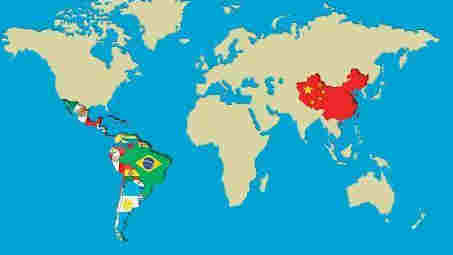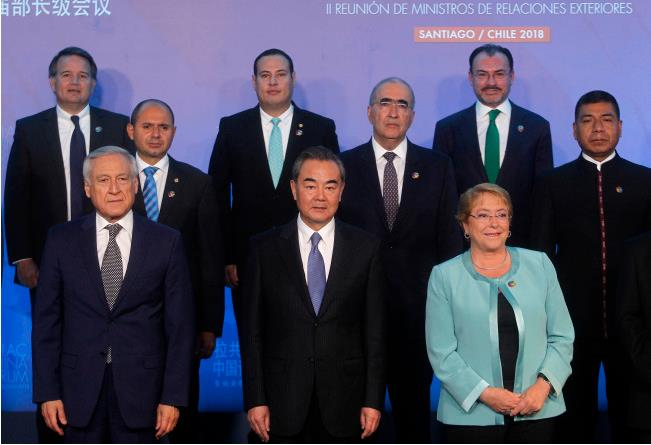
Opinions
16:42, 27-Nov-2018
Opinion: Opportunities and challenges face China-LatAm community of common destiny
Updated
15:31, 30-Nov-2018

Editor's Note: The following is an edited translation of a commentary from the Chinese-language "Commentaries on International Affairs."
Chinese President Xi Jinping will embark on his state visits to Spain, Argentina, Panama and Portugal starting on Tuesday (Nov. 27), during which he will attend the G20 summit to be held in Buenos Aires. Against the backdrop of increasing uncertainties around the world, China and Latin American countries face both opportunities and challenges in developing a community of common destiny.
Geographically, China is located far away from Latin America and the Caribbean countries. But they are all emerging economies and developing countries, which are important forces for maintaining world peace and development. The two sides have long been actively exploring development paths of their own and have scored remarkable achievements.
In recent years, Chinese leaders have proposed a series of major initiatives to strengthen China-Latin America relations and cooperation in various fields. They are committed to building a community of common destiny based on political trust, economic and trade cooperation and mutual benefit, cultural exchanges and mutual learning, and close cooperation on international affairs.
This has undoubtedly given China-Latin America relations new development goals and momentum. President Xi Jinping has visited Latin America three times before while in office. The China-CELAC Forum has become a main channel for comprehensive cooperation between China and Latin America, leading to fruitful results in various fields.
A policy paper issued by the Chinese government two years ago clearly stated that Latin America is "a land of vitality and hope," and "the development of China cannot be possible without the development of other developing countries, including those in Latin America and the Caribbean."
President Xi Jinping's upcoming fourth visit to Latin America will not only inject new vitality into the development of bilateral relations but also bring three major opportunities for the two sides to strengthen cooperation in global governance.

(Front L-R) Chile's Foreign Minister Heraldo Munoz, China's Foreign Minister Wang Yi and Chilean President Michelle Bachelet pose for a family picture at the Second Ministerial Meeting of the Forum of China and the Community of Latin American and Caribbean States (China-CELAC) in Santiago, January 22, 2018. /AFP
(Front L-R) Chile's Foreign Minister Heraldo Munoz, China's Foreign Minister Wang Yi and Chilean President Michelle Bachelet pose for a family picture at the Second Ministerial Meeting of the Forum of China and the Community of Latin American and Caribbean States (China-CELAC) in Santiago, January 22, 2018. /AFP
China and Latin America should take this opportunity to strengthen consultation and cooperation and jointly oppose hegemonism, unilateralism and protectionism, which have undermined the foundations of multilateralism, jeopardized international trade, and posed a threat to world peace and development.
China and Latin America's annual bilateral trade volume has reached 250 billion U.S. dollars in recent years, benefiting greatly from the global multilateral trading system. Therefore, both sides should voice their opposition to trade protectionism in multilateral mechanisms such as the World Trade Organization and safeguard free trade with practical moves.
China and Latin America should take pragmatic measures to implement the Belt and Road Initiative (BRI). Since President Xi Jinping proposed the initiative five years ago, many Latin American countries have responded positively to it.
The Chilean and Argentine presidents, together with nearly 20 Latin American and Caribbean ministerial officials and regional organization leaders, attended the first Belt and Road Forum for International Cooperation held in Beijing last year. They all expressed their willingness to promote the integration of regional and national development strategies with the BRI, speed up the infrastructure construction in the southern hemisphere, and promote South-South cooperation.
In January this year, Chinese Foreign Minister Wang Yi said at the second ministerial meeting of the China-CELAC Forum that the BRI cooperation will be the "golden key" to a bright future for the two sides, as well as a big step toward the China-Latin America community of common destiny.
He also noted that the Belt and Road is the most important international public program that China provides to the world. For that matter, both China and Latin American countries should adhere to the principle of achieving shared growth through discussion and collaboration, and take pragmatic measures to facilitate policy coordination, infrastructure connectivity, unimpeded trade, financial integration and closer people-to-people ties, in a bid to achieve early harvest.
Moreover, China and Latin America should strengthen cooperation in promoting global governance. Global issues are not caused by globalization, but the development of globalization has indeed exacerbated some global problems. The solution is to promote global governance. Countries should work together to abide by the principle of common but differentiated responsibilities and strengthen communication and collaboration within international multilateral mechanisms.
China and Latin America should jointly safeguard the international order and system centered on the purposes and principles stated in the UN Charter, promote multi-polarization as well as the process of democratization and rule of law in international relations. Both sides should also join hands to ensure the enhanced representation and voice of developing countries in decision-making processes of international institutions and at the same time promote global governance reform.
What's noteworthy is that when China and Latin America are building a community of common destiny, they both need to properly cope with possible interference from the United States. Washington has long seen Latin America as its "backyard," and would not allow its traditional sphere of influence in Latin America to be challenged. It cannot tolerate the presence of any "centrifugal force" in Latin America.
Since the beginning of this year, the United States has not only reiterated the importance of Monroeism but also regards the establishment of diplomatic relations between China and Dominica, El Salvador and Panama as a threat. Not long ago, Washington recalled the ambassadors and charge d'affaires from those three countries to discuss ways in which the United States can "support strong, independent, democratic institutions and economies throughout Central America and the Caribbean." This move indicated that the United States is highly alerted and opposed to China's presence in Latin America.
As a matter of fact, Latin American countries have been maintaining close ties with most countries in the world, and developing relations with China is nothing but natural. China-Latin America relations are based on mutual benefit and win-win partnership. They do not target any third party.
China-Latin America economic and trade relations are not only conducive to the development of Latin America but also beneficial to maintaining stability in the region. A prosperous Latin America is in line with the strategic interests of the United States in the Western Hemisphere.
China, the United States and Latin American countries should uphold the spirit of openness and tolerance, allow their respective advantages to manifest, strengthen cooperation in developing the Latin American market, and strive to achieve a "triple-win" in favor of all parties.
(If you want to contribute and have specific expertise, contact us opinions@cgtn.com)
Source(s): China Plus

SITEMAP
Copyright © 2018 CGTN. Beijing ICP prepared NO.16065310-3
Copyright © 2018 CGTN. Beijing ICP prepared NO.16065310-3